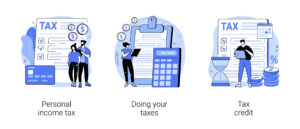How to Avoid Tax Preparation Scams
With so much to do and so many other important things to worry about, many people will be looking for help over the coming weeks and months with their income tax returns. While some people might just choose the first name they see to file their taxes, whom you choose can actually make a big difference.
Not only can your tax preparer play a big role in how much money you get back, but also there are some preparers that are simply looking to scam you. With nearly 60 percent of all tax returns being done by paid tax professionals, that means there is a lot of risk to taxpayers if they don’t choose wisely.
Fraudulent tax preparers use many different kinds of scams to cheat people out of money. These scams vary, with some preparers filing false returns in order to collect more money and others being outright scams, wherein the preparer files unauthorized returns and then takes most or all of the refund. The real problem for you the taxpayer is that if the IRS catches these fraudulent returns, you will be held liable even if you weren’t aware of your tax preparer’s actions.
So what should you do to avoid these scams? These are just a few ideas to keep in mind:
- Stay away from preparers asking for a percentage of your refund as their fee.
- Make sure you always look at the fine print and don’t sign a blank return.
- Never hand over financial info to a preparer unless you’ve chosen him/her to prepare your return.
- Make sure the preparer has signed the return and has included his/her IRS Tax Preparer Identification Number (PTIN).
- Don’t trust a preparer who doesn’t ask a lot of questions.
- Check out what the IRS says about choosing a tax professional.
Don’t get scammed by a shady tax preparer, make sure you do your homework first. Of course, you can always trust GROCO to give you honest and timely service. Our goal is to help you pay as little in taxes as legally possible. Contact us today at 1-877-CPA-2006.
Income the IRS Can’t Touch
Income the IRS Can’t Touch There’s one readily available and legal source of untaxed income that we know of: municipal bonds. These securities are issued by state and local governments, school districts, hospitals and other public agencies to support community projects and services. To permit these worthy endeavors to raise money economically, Uncle Sam exempts…
Avoiding Real Estate Tax Revaluations
Avoiding Real Estate Tax Revaluations by Steven Singer, CPA As a result of the passage of Proposition 13 almost thirty years ago, real estate owners currently enjoy paying property taxes based on the property’s purchase price, value of improvements and an annual increase of 2% over the previous years’ assessed value. As a result of…
Annuities in Qualified Retirement Plans
Annuities in Qualified Retirement Plans By Russell Hill Using annuities in qualified retirement plans. Qualified annuities reduce your current taxable salary in addition to accumulating tax deferred earnings, when you contribute money to an annuities program through an employer (as one of the investment options in a salary reduction retirement plan). Those who work for…
Paying Too Much In Taxes?
Paying Too Much In Taxes? By Theodore Lanzaro Now that the end of the year is near, it is time to review a few business tax tips for 2008. Anyone who owns a business or is planning to start a new business in 2008 should be thinking about maximizing the profitability of their business and…


